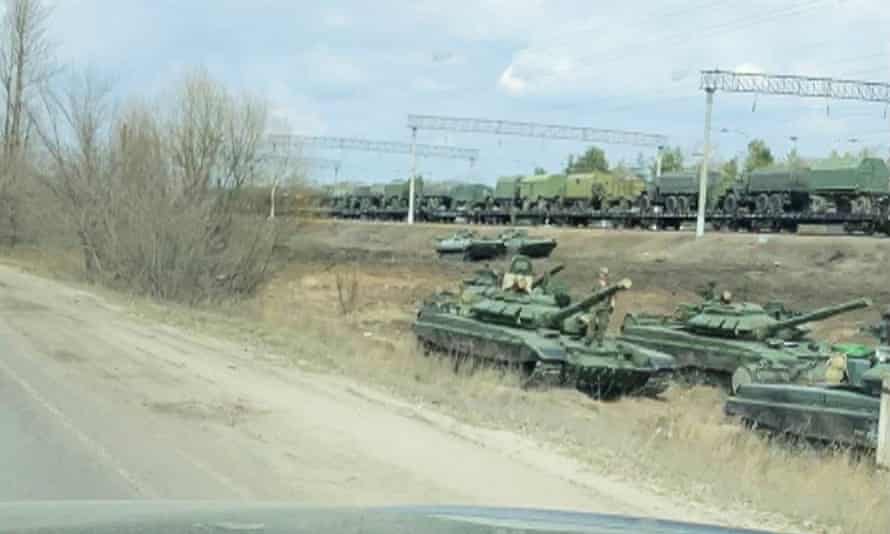Analysis: there are several reasons Russia would want to raise tensions, but an attack appears unlikely

Russia’s fortnight-long military buildup to the east and south of Ukraine has helped it mass an estimated 80,000 troops in the border region in an attention-grabbing exercise that is increasingly occupying western thinking.
Tanks and other artillery units have also been arriving at Voronezh, east of Ukraine, according to Janes, a military intelligence firm, and a staging ground for about 3,000 troops been established to the south of the city.
A nervous government in Kyiv says Russian forces in the Voronezh region number 40,000. It says a further 40,000 are now stationed in Crimea, which was seized in a surprise operation by Moscow in 2014.
“This movement stands out as possibly the largest unannounced movement of troops since Russia’s invasion of Crimea,” said Thomas Bullock, an analyst at Janes. He estimates that several thousand troops have arrived in the last fortnight from as far afield as Siberia to the east and the Estonian border in the north.
Nor is it just the size of the redeployment that has attracted attention. Its broad composition, including short-range ballistic missile systems, plus a strengthening of the Black Sea fleet, has many of the components of a force military experts say could attack Ukraine, with the possible exception of combat aircraft.
That would represent a dramatic escalation of the conflict that has simmered since Crimea was taken and Russian-backed separatists seized the border Donbas region seven years ago. Already an estimated 14,000 people have been killed.
Rob Lee, a doctoral student who follows Russian deployments at King’s College London’s war studies department, said: “In this case Russia is moving the military assets near the border that they would use in an actual invasion. I think it is a demonstration, but it is disconcerting because it isn’t like previous scares.”
In response, Ukraine’s president, Volodymyr Zelenskiy, has been engaged in an intense bout of diplomatic activity, calling for the west to strengthen its presence in the region – and pressing for a pathway to join Nato, the membership action plan, which the alliance has yet to grant despite promising to do so as long ago as 2008.
Turkey said over the weekend that two US destroyers were expected to enter the Black Sea, although they would be no match for the Russian fleet, with 45 vessels. The UK, which signed a military cooperation agreement with Ukraine last October, flies spy planes in the region to monitor troop movements.
Potentially more significant, however, was Zelenskiy’s visit to the Turkish capital, Ankara, where he met his Turkish counterpart, Recep Tayyip Erdoğan, for three hours of talks on Saturday to discuss defence industrial cooperation.
Reports circulated afterwards that Ukraine would buy next-generation Turkish Bayraktar drones on top of at least six it owns already. Such weapons proved devastatingly effective when used by Azerbaijan against Armenia’s Russian-made tanks in Nagorno-Karabakh last autumn.
Few believe that immediate military action is likely. Security at the Voronezh staging post was sufficiently lax that journalists from Sky News were able to drive in, and if an attack was seriously meant then it would be more likely be conducted by surprise, according to Maryna Vorotnyuk, a research fellow at the Rusi thinktank.
She argued there were several reasons why Russia would want to raise tensions. Relations with the US are poor after Joe Biden agreed that he thought Vladimir Putin was “a killer” in a TV interview last month, prompting Moscow to recall its ambassador.
It could help in “distracting the attention from [Alexei] Navalny”, the dissident whose health is deteriorating rapidly in jail, she added, and could be a response to Zelenskiy’s hardening stance on Russia, with Kyiv having targeted the oligarch Viktor Medvedchuk – the main Russian ally in Ukraine – with sanctions.
“These are classical tools from the Russian military playbook: sowing confusion about Russian real intentions and limits,” Vorotnyuk added.
But there remains a fear that the Kremlin could be looking for a pretext to go further, forcing Kyiv into actions that Moscow could then seek to exploit.
Last week Dmitry Kozak, Putin’s deputy chief of staff, said Moscow could “come to the defence” of Russian-backed separatist territories, and warned of potential ethnic cleansing in the Donbas, although there is no evidence that this is taking place.
Nigel Gould-Davies, a Russian specialist with the IISS thinktank, said: “We should be prepared for surprises. Any threat to Ukraine is by extension a challenge to Europe. It is a situation that will be a test of European and transatlantic resolve.”
